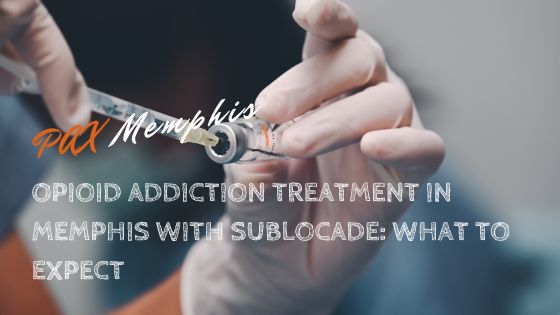According to the Centers for Disease Control and Prevention (CDC), “Over 75% of the nearly 107,000 drug overdose deaths in 2021 involved an opioid.”[1]
Opioid addiction is increasingly common and continues to cause higher death rates each year, so it’s essential that treatment methods are effective. One of the most promising approaches is referred to as medication-assisted treatment (MAT). MAT combines traditional therapies with the use of FDA-approved medications to limit withdrawal symptoms and cravings.
A popular medication used during MAT programs is Sublocade. Sublocade is the brand name for an injectable version of buprenorphine, a partial opioid agonist that lessens withdrawal symptoms and cravings, both of which are common during early recovery.
Speak with a team member at PAX Memphis today to find a Sublocade treatment provider near you.
How Does Sublocade Treat Opioid Addiction?
Sublocade is the brand name for an injectable version of buprenorphine, which is also available via tablet. The difference between Sublocade and buprenorphine tablets is how frequently they are administered. While the tablets must be taken daily, Sublocade injections are only required once a month.
Sublocade works to treat opioid addiction by partially binding to opioid receptors in the brain. As a result, your withdrawal symptoms and cravings will be reduced substantially. It is important to note that Sublocade is not intended to cure addiction, which means you will still have to participate in counseling to address the root causes of your opioid abuse and learn healthy coping mechanisms.
What to Expect During Opioid Addiction Treatment in Memphis With Sublocade
Medication-assisted treatment (MAT) programs in Memphis that use Sublocade offer a variety of services, including individualized treatment, individual therapy, group counseling, relapse prevention planning, and aftercare support. All of this combined will ensure that you have a strong foundation of recovery to rely on and reduce your chances of relapsing.
Intake and Assessment
Treatment starts with the intake process. This often involves signing medical release forms, giving the admissions counselors your insurance information, and providing other documents necessary to begin treatment.
Another important step in the intake process is your initial assessment. The medical team will ask you questions about your physical and mental health as well as your history of opioid abuse. This information will then be used to create an individualized treatment plan that includes things like how long you need treatment, what dose of Sublocade is appropriate, what types of therapies you would benefit from, whether you need mental health support, and more.
Induction
Once your treatment plan is created, you will begin the induction phase that is required before taking Sublocade. This involves taking the transmucosal version of buprenorphine for 7 days to ensure that the medication is right for you.
During this time, your doctor will be able to figure out what dose is appropriate, whether Sublocade will be effective in managing your withdrawal symptoms, and how your body responds to buprenorphine in general.
Administration of Sublocade
If induction is successful, you will receive your first injection of Sublocade after 7 days of taking the buprenorphine films. The injection is given just under the skin in your abdomen. You might notice a small bump under your skin at the injection site (referred to as a depot), which releases the substance into your body throughout the month.
Depending on your needs, you will be given a dose of either 100 or 300 mg. This is administered once a month throughout your treatment program.
Your doctor will check in with you regularly to ensure that your withdrawal symptoms or cravings are being controlled by the Sublocade.
Individual Counseling and Group Therapy
In addition to receiving Sublocade, you will undergo individual counseling and group therapy. Therapy is used to treat opioid addiction by identifying and addressing the root causes of your substance abuse, helping you develop healthy coping mechanisms, and altering negative patterns of behavior.
Relapse Prevention and Aftercare
Before you complete your treatment program, you will develop relapse prevention skills that help you maintain sobriety long-term. This might include developing a list of triggers to avoid and healthy coping mechanisms to use in times of need.
Your opioid addiction treatment program will also provide you with access to aftercare services, which aid in relapse prevention. Examples of aftercare services include:
- Continued therapy
- Medication management for Sublocade
- Access to alumni support groups
- Referrals to outpatient rehab or sober living programs
- Recommendations on local support groups to attend
- Case management services like vocational training
Find Sublocade Treatment in Memphis
If you or a loved one struggles with an opioid use disorder, opioid rehab programs in Memphis can help you recover with a combination of evidence-based therapies and FDA-approved medications like Sublocade.
To get connected with Sublocade treatment in Memphis, contact PAX Memphis today.
References:
- The Centers for Disease Control and Prevention (CDC): Understanding the Opioid Overdose Epidemic, Retrieved January 2024 From https://www.cdc.gov/opioids/basics/epidemic.html
- U.S. Food & Drug Administration (FDA): FDA approves first once-monthly buprenorphine injection, a medication-assisted treatment option for opioid use disorder, Retrieved January 2024 from https://www.fda.gov/news-events/press-announcements/fda-approves-first-once-monthly-buprenorphine-injection-medication-assisted-treatment-option-opioid
- National Library of Medicine: Clinical Review Report: Buprenorphine extended-release injection (Sublocade), Retrieved January 2024 from https://www.ncbi.nlm.nih.gov/books/NBK546461/
Medically Reviewed: September 25, 2019

All of the information on this page has been reviewed and verified by a certified addiction professional.










